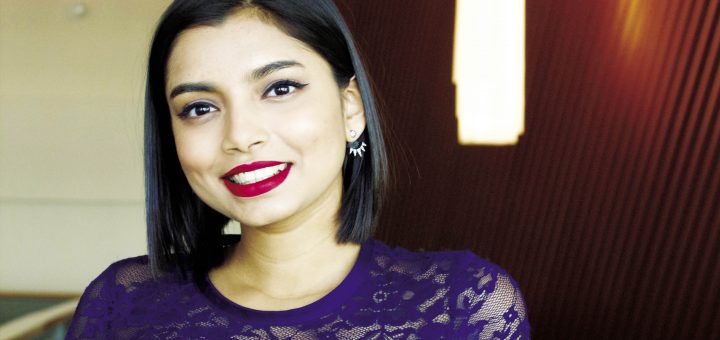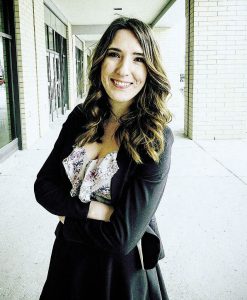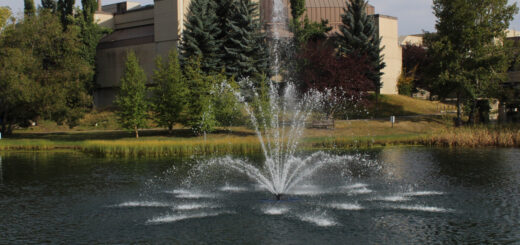Meet your new all-female Representative Executive Council

SAMRU Election 2017’s new reps for VP Academic, VP Student Life and President
By Anna Junker, Staff Writer
This year’s election for SAMRU Representative Executive Council saw 1502 students, 15.9 per cent of the MRU student body, come out to vote. Shifrah Gadamsetti was re-elected as President, Madelaine McCracken was voted in as VP Student Life and Cordelia Snowdon as VP Academic. These women ran on ideas such as increased mental health initiatives and affordable resources/textbooks for students. The Reflector did a Q&A with the winners to learn more about them and their platforms.*
*Some answers have been edited for length and clarity.
Reflector: Why did you choose to run?

Madelaine McCracken has been voted in as this year’s VP Student Life for SAMRU. She campaigned on ideas such as self-esteem and mental health workshops, increased campus event awareness, cross campus collaboration, safety and increased charity initiatives. Photo Courtesy of McCracken’s campaign Facebook page
Shifrah Gadamsetti: I chose to re-run for a variety of reasons, but the most compelling would likely be the amount of unfinished work I would like to see through to completion, and also build upon. Examples of this would be the tuition review, seeing outcomes, and making sure the policies I’ve put forward in partnership with the other universities in Alberta come to fruition. As well, I’ve built some amazing relationships with university administration and government, and I feel like there’s no better time to use them to create positive opportunities for students.
Madelaine McCracken: I chose to run this year because I am ready to make a difference in the Mount Royal University community. I have worked hard to establish relationships and connections within the MRU community and abroad. Being a Resident Advisor, a part of the Iniskim Center, having affiliations with Free the Children, and involved with on-campus clubs, I want students to continuously be aware of the opportunities that are available to them on campus and off campus and find ways to be engaged and involved in their own means. This community is essential to me and I want it to mean a lot to others too.
Cordelia Snowdon: I love Mount Royal and have been involved on campus for five years, and I have seen the crucial role the VP Academic plays in supporting student success. I chose to run because I believe everything I have learned over the past five years will make me an excellent VP Academic.
R: Why do you think it is important to run?
SG: Democratic engagement is a really important value for me. While people are hired into positions all the time, I think there’s something really special and valuable about being elected into a position. Running means that you’re hoping to represent the best interests of your constituency, and in this case, it’s the wonderful students of this place I’m so in love with.
MM: The most important aspect of running, or doing anything you’re afraid to in life, is to simply learn more about yourself and in what you can achieve and to ultimately make mistakes. These mistakes will turn into victories. Not only is it important to run for the aspect of self progression, but it is important to run as you will be able to get involved and manifest lasting relationships and connections that will be with you for the rest of your life.
CS: It is important to run because it shows students that you understand the issues and are able to put yourself out there and be involved.
R: What kind of self esteem, mental health programs, workshops and policies would you like to see implemented?
MM: First, I want to be on mainstreet and have coffee corners where we talk about mental health. After this, I will be able to program suitable workshops. These workshops will be around developing positive self-esteem habits, and ways to embrace mental health. I would love for wellness services to lead these workshops. I will also facilitate de-stressing events! More of those will be discussed after further discussion with the board! I am so honored and thrilled to continuously de-stigmatize mental health and to have more conversations pertaining to self-esteem development within the MRU community.
CS: My platform is not just about creating policies that explicitly acknowledge mental health, it is also about taking mental health into consideration when creating other policies, programs, and practices. Changes can have unintended consequences for student mental health, and I will continue to remind policymakers to consider mental health impacts when working on policies.
R: Shifrah, how will you encourage professors to use free resources? What types of free resources are available to them?

Cordelia Snowdon has been voted in as this year’s VP Academic for SAMRU. She campaigned on ideas such as affordable resources for students, supporting smaller class sizes and promoting mental health and student well-being. Photo courtesy of Cordelia Snowdon
SG: Last year, I focused a fair bit on “free online textbooks”, and I’m glad to say the work that Robbie Nelson and I have been doing has really encouraged the awareness and use of these resources, also known as Open Education Resources on campus. We curated and participated in a #TextbookBrokeAB media campaign towards the government to highlight how costly and burdensome textbooks really are, and we’ve also helped the library faculty with awareness campaigns in the past semester geared at professors, some of whom are really wary about using a resource they aren’t used to. We’ve seen that professors are increasing their use of free resources, whether that be YouTube, Netflix, open resource textbooks, the National Film Board, online articles instead of textbooks, etc. and students are really benefitting from this… The resources already exist, and they are amazing quality, we just need to start using them!
R: Cordelia, how has having small class sizes benefited you in your learning?
CS: Small classes have benefited my learning because I have been able to build close relationships with my classmates, to participate actively in class, and to build connections with my professors. These experiences have helped me learn better and also to feel like a part of a supportive community.
R: Madelaine, could you give more details about the charity event you would want to implement?
MM: I want to create a large scale Bike-a-Thon that can occur in our main gym. In this collaborative fundraising event, students will be able to sign up in teams that have up to 12 members and will take turns riding their stationary bike for the total amount of 48 hours. But don’t freak out! You will have a shift of 1 hour every 12 hours due to the amount of people on your team. Students will be able to fundraise money through asking for donations from their individual establishments, home, and friend communities. Wherever they raise money from, it will go to the charity they wish it to go to. The team that raises the most amount of money will win a prize as it will create incentives and excitement.





